They Snuck Off on Spring Break in the Middle of the Pandemic. Then the Internet Sleuths Found Them.

Ask them, and they’ll tell you they weren’t being assholes. It’s just that everything had already been paid for…they couldn’t not go. That’s how several of the now-infamous 211 University of Texas at Austin students explain why, for nearly a week this spring, in the middle of the coronavirus pandemic and social distancing orders, they ended up partying in Cabo San Lucas.
When they got back, they turned their Austin neighborhood into a COVID-19 hot spot. More than 60 of them tested positive, and the group would become a national symbol of selfishness, their selfies from paradise dragged in thousands of tweets.
This is the story of what it was like on the inside.
Carolyn Plein, UT senior: People were talking about coronavirus, but it didn’t seem like that big a deal. It was just like, “Wash your hands.” Everything felt pretty normal—until Friday.
JusCollege email, March 12:
Mexico currently has far fewer cases of COVID-19 than the United States and we believe that our travel destinations remain among the safest and most enjoyable places in the world to visit right now….We are currently in our second week of Cabo and have had almost 5,000 travelers, all with no issues.
Riley*, UT sophomore: A group of us had booked spring break trips with a company called JusCollege. There were two charter flights, one on Friday and one on Saturday. It cost about $2,000 apiece, and I worked multiple jobs over the summer to pay for it. The whole day before we left was spent discussing whether we should still go because of coronavirus. Lots of my friends were like, “Who cares if there’s a risk? You only live once!” I have a friend with respiratory issues. He and I were scared. We texted the trip rep for refunds, but she said no. I was like, Whatever, okay. Let’s go.

Kaya Epstein, UT freshman: People in my classes were saying they were still going to go. It rubbed me the wrong way. Our professors were like, “Are you sure?”
Callie*, UT sophomore: Right before we left for Mexico, I was at a funeral with hundreds of old people, everyone hugging. My parents weren’t self-isolating.
Texas Governor Greg Abbott, Friday, March 13:
COVID-19 poses an imminent threat of disaster….I hereby declare a state of disaster for all counties in Texas.
UT News, Friday, March 13:
UT Austin will be closing operations and canceling classes.
J. B. Bird, UT Austin Director of Media Relations and Issues Management: By that point, the university had restricted travel for business purposes. We have no jurisdiction, and certainly no enforcement ability, to ban personal travel. But we did put guidance out encouraging students not to travel.
Camron Goodman, UT senior and Student Government President: We all received emails from at least three different offices talking about taking precautions for spring break.
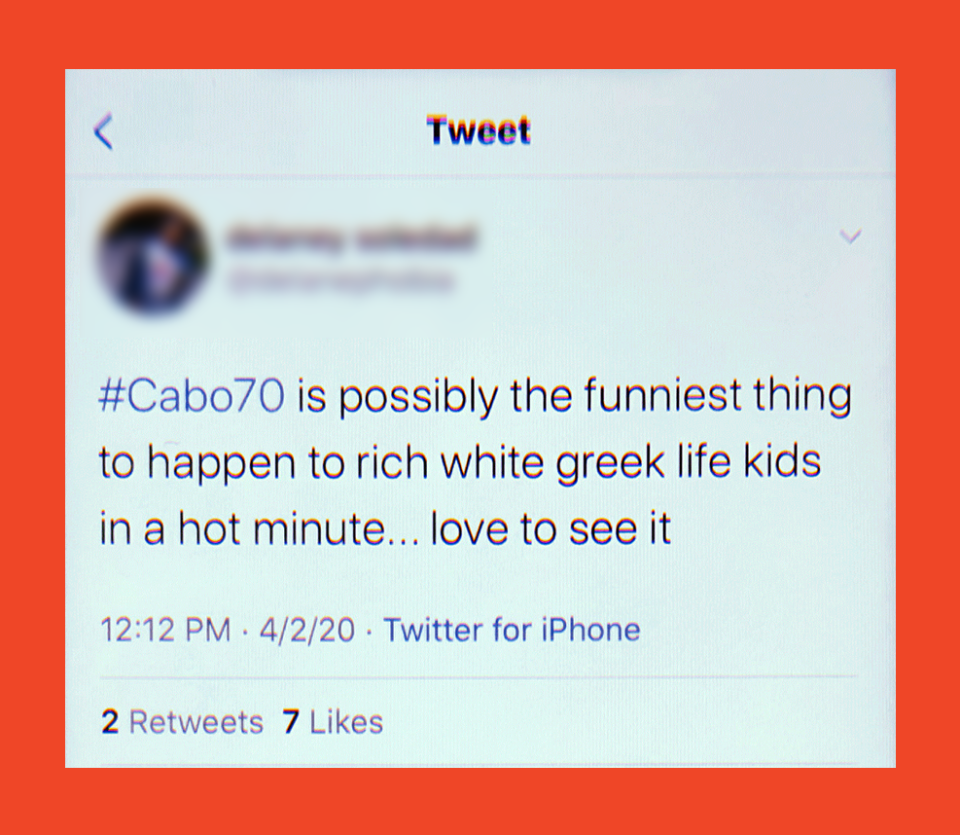
Amy*, UT sophomore: Our parents questioned us about whether it was morally right to go to Cabo. They said it was a really bad idea. The general consensus from all our friends was that we were still going to go. We all agreed we’d socially distance as much as possible.
Riley: Everyone on my flight that Friday was a sophomore, the majority involved in UT Greek life. The airport seemed normal, but when we got to the gate, they were reading people’s names off a list who weren’t there. It was obvious that 50 to 60 percent of the people who had booked the trip didn’t show up.
Riley: My mom had stressed to me that I needed to wear gloves and a mask on the plane, so I did. But once I got to Mexico, I did not act cautiously at all. Vendors on the beach were selling headbands that said “NO Corona VIRUS,” and some of my friends bought them. Nobody was worried.
The Washington Post, March 19:
Even as public health officials repeatedly urged social distancing, the young and hip…gleefully hopped on flights, tweeting about the rock-bottom airfares. And they gathered in packs on beaches.
Enrique Gandara, Vice President of Sales and Marketing at Pueblo Bonito Golf & Spa Resorts: Our resorts in Cabo have been hosting JusCollege for three years. When the spring breakers came this year, there were no cases in Los Cabos. We always have disinfectant gel in our restaurants and pool areas—we increased that throughout the hotels and disinfected high-touching points. Was there social distancing? No. People were having fun.

Riley: Rae Sremmurd played a concert. We went to pool parties. You can imagine a bunch of college kids in Mexico—there’s no way we’re standing 6 feet apart. Honestly, it was the most fun trip I’ve been on by far.
Guest at Pueblo Bonito, writing on Yelp, Mid-March:
It was quiet until spring break…do not recommend coming in after the first week of March. The dynamics of the whole facility change. Loud, rowdy.
Callie: People were partying at clubs and concerts in groups of hundreds of people. Huge, huge groups. We started to hear about people’s temperatures being taken in the airport. Then there was talk of the border closing. That freaked us out.
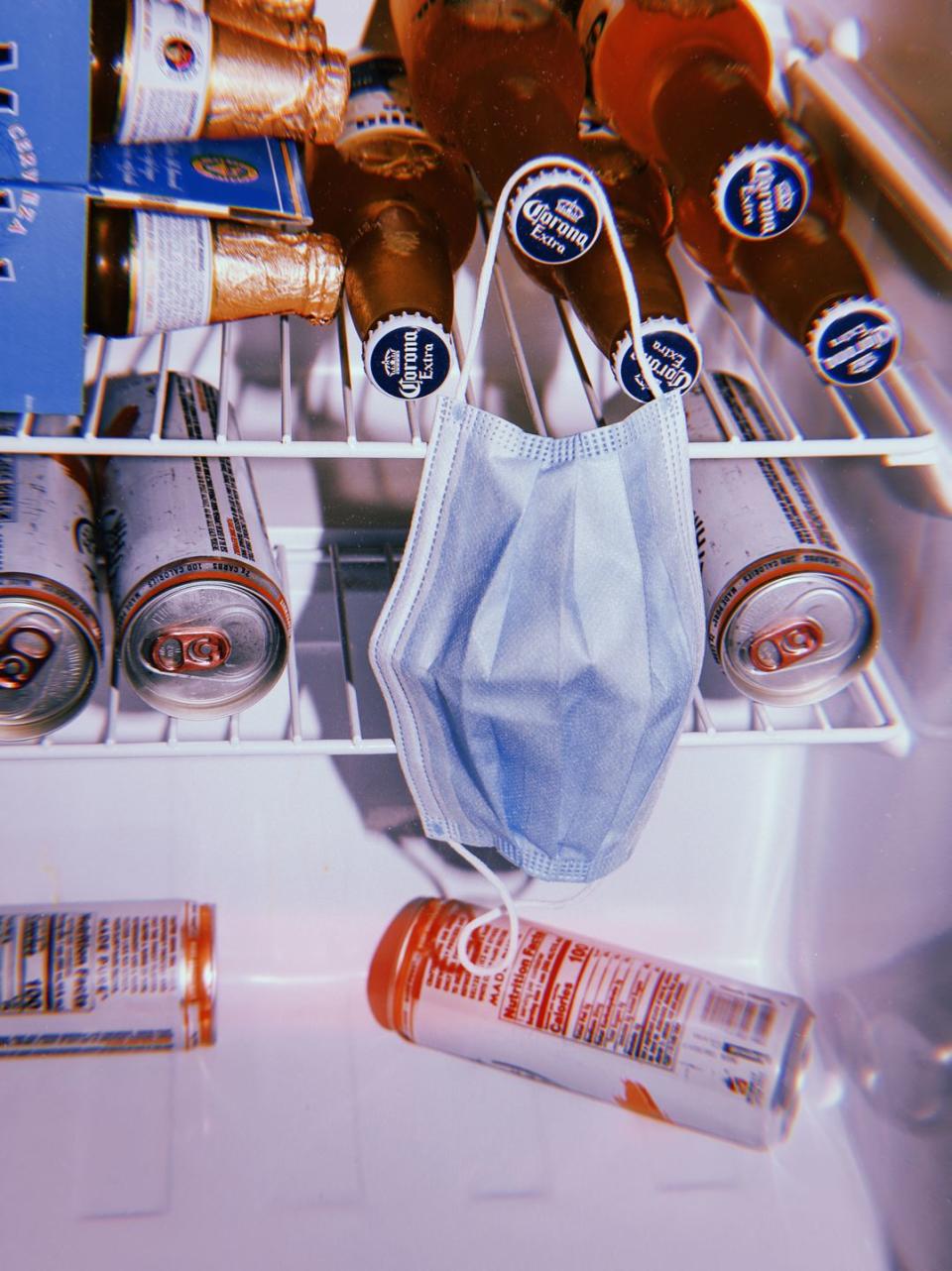
Riley: On the flight home, everyone was listening to music or taking a nap. We wiped down seats, put on gloves and masks, and closed the A/C vents.
The White House, March 20:
The United States has reached mutual agreements with Canada and Mexico to restrict nonessential travel across our northern and southern borders.
Rodrigo Esponda, Managing Director at Los Cabos Tourism Board: On March 21, the first case of coronavirus was detected in Los Cabos. Shortly after, all spring break activities were suspended.
Riley: I’d returned home on a vacation high. But when I’d walked in the door, instead of saying hello, my roommates were yelling at me to take off my clothes and shower. Everyone who didn’t go on the trip had been watching the news all week. They were scared of us.
CNN, March 25:
The U.S. experienced its deadliest day of the coronavirus pandemic on Wednesday...The dramatic spike brought the number of novel coronavirus deaths…to at least 928….More than 65,000 people in the United States have now had a positive test.
Suzanne, UT senior: There was some gossip going around in my Zoom classes about students who went on spring break and may be sick.
Riley: My friend told me one of the seniors on our trip had a fever. He told me not to tell anyone. She ended up testing positive.
Amy: I tested negative, but one of my guy friends tested positive. He didn’t tell anyone—it’s a bad reputation to have. Fortunately, he never got sick.
J. B. Bird: We initially heard from UT Health Austin about a small number of students who tested positive. At that point, the most important thing was reaching out and diligently doing the contact tracing, making sure everyone those students came in touch with got tested.

Callie: My roommate, my friend, and I got tested because we had been exposed to someone who was positive. I started crying afterward. I hid in my room for a week.
Rebeccah Macias, UT senior and social media editor at The Daily Texan student newspaper: I was at my parents’ when I got a message on Slack: A cluster of students who went to Cabo over spring break tested positive for coronavirus. I tweeted it out. My phone started going off every five seconds.
Texas House of Representatives Speaker Dennis Bonnen, March 31:
Quit being an ass….Get over yourselves….Whether you think [coronavirus] could affect you or not, it does. The reality of it is, if I’m a college kid who’s going to spring break in Mexico, you’re affecting a lot of people. Grow up.
The New York Times, April 1:
Austin outbreak is the latest result from a group of college students who ignored social distancing guidelines, went on traditional spring break trips, and have now tested positive….Many of them appeared to be under the mistaken impression that young people are not as likely to get the coronavirus as older people are.
Kaya Epstein, UT freshman: UT Twitter is kind of like its own little army. It got really chaotic starting at 10 p.m. on April 1. Everyone was awake, just continuously tweeting and retweeting. There were more than 12,000 tweets about it. We were the number one trending thing on Twitter for a good 12 hours. It was like, How could you be so stupid?
Chad, UT sophomore: I was chilling on my couch when I saw what was happening on Twitter. Some people did some sleuthing and were posting screenshots of Instagram photos of UT students who went to Cabo. I went to one of the girls’ profiles and saw a pic of her in a swimsuit on a boat, lots of people around her, and I left a comment like, “You’re bringing back corona.” I was a little pissed.

Kaya Epstein: It came out that a lot of the students were members of sororities and fraternities. Greek life has a lot of power at UT. They own the student government, they have the most money, the most connections to the administration. And they have a history of racism, of awful hazing, of sexual assault that never seems to get addressed. That anger fed into the reactions on Twitter.
Callie: My friend woke me up and was like, “Holy shit, look at what everyone is saying.” I thought, No one can find out I went. My friends and I deleted every single picture of us from Cabo.
Amy: Some people still found us. We all got DMs—they said we went to Cabo using our daddy’s money, called one of my friends a vapid cunt. Then someone spray-painted “Eat the rich” on the side of a sorority house.
Callie: I got really worried when I saw my name on a Twitter list of students who allegedly went to Cabo. They were saying we should be blacklisted from law and medical schools. My roommate got three anonymous phone calls from people calling her “whore” and “slut.” It seemed like all the hate was directed at women. I screenshotted the list and DMs I got and sent them to my parents because I was scared. I was like, There’s no way a stable person sent these.
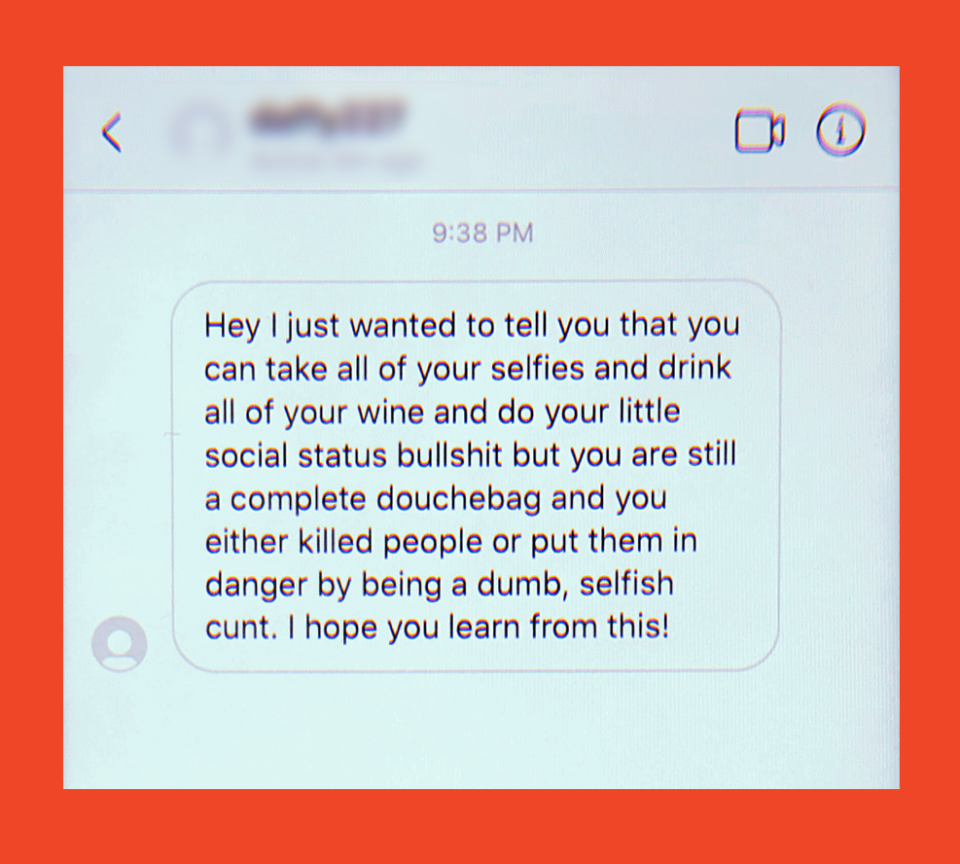
Riley: People posted memes on a UT page on Facebook with 45,000 followers. It was like the whole school was coming together to roast this group who went on spring break, including me. I couldn’t sleep. I kept thinking I would get death threats.
Chad: Later that night, I got this message. It was the mother of that girl whose Cabo picture on Instagram I’d commented on, saying she was going to send the Austin PD after me. My mind started wandering: What if they sue me? I think almost any judge would laugh this out of the courtroom unless you gave them a ridiculous amount of money—but this woman does seem to have that kind of money! Then these guys started messaging me defending the Cabo girls in the photo. I know guys like to prove themselves to pretty sorority girls—so if they see the guy who put them all on blast, they might want to go beat the shit out of him real quick. I changed my Instagram name.
KVUE, Austin ABC-Affiliated News Station, April 2:
West Campus near UT Austin is now a “hot spot” for COVID-19….After more than 40 students who traveled to Cabo for spring break tested positive for COVID-19, the area will likely see an increase in confirmed cases.
J. B. Bird: Ultimately, there were 62 students related to the Cabo cluster who tested positive or were presumed positive.
Callie: Meanwhile, I know people who were part of that group who were not self-isolating. They truly did not give a shit. They were throwing parties pretty regularly with a lot of people.
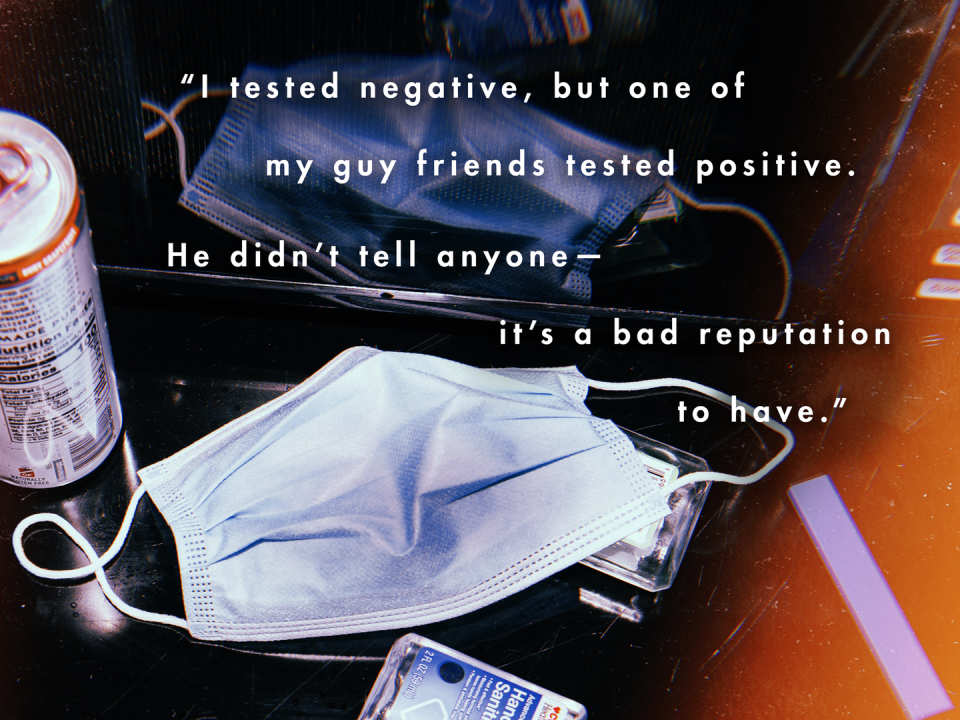
Samuel Veloz, UT senior: Someone in one of my group projects said on Zoom that she had been to Cabo. She was upset that they were being cyberbullied, being called spoiled white kids. She seemed more focused on the bullying than the harm she may have caused. We were all taken aback. I’m a person of color, and I know the virus disproportionately affects my community. I asked her if she got tested, and she said no but her roommates had and they were negative. I was like, “That doesn’t mean you’re not positive.”
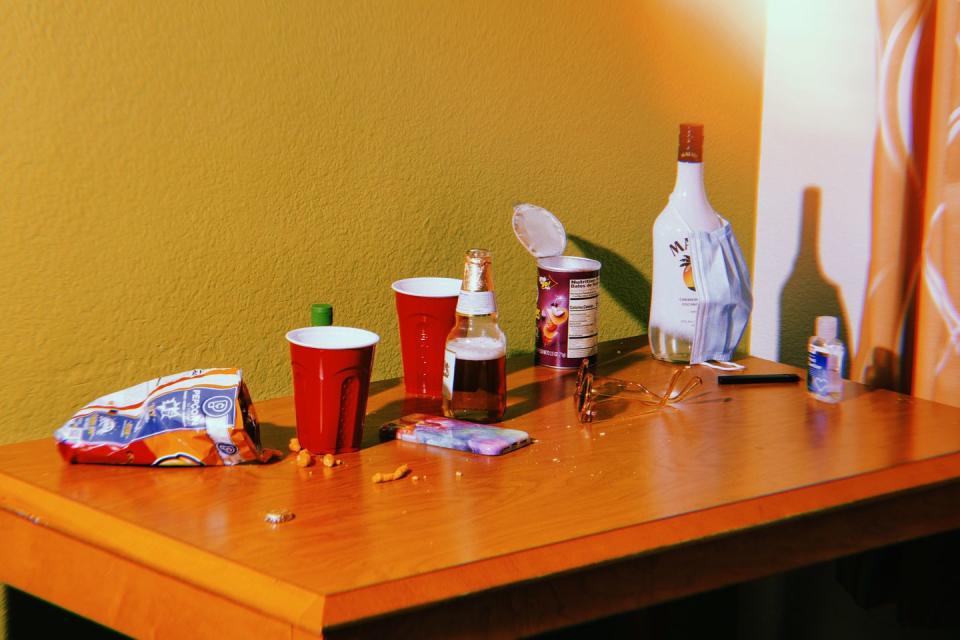
Kaya Epstein: These wealthy white Greeks were able to come back and get tests when others could not. I heard they faced no repercussions. But a few students who made comments on social media were supposedly called in for disciplinary meetings.
Austin American-Statesman, April 3:
[Officials report] an increase of 79 new cases, the largest daily jump since the pandemic began….The majority of those who have tested positive for the illness in Travis County are between 20 and 39 years old, according to health officials’ data.
Riley: In my group chat, all my friends were saying how this wasn’t our fault. One girl I know thought what we did was completely wrong—she was like, “You were selfish.” At first, I felt bad that she wasn’t taking my side. But she helped me realize that it was our fault, and we do bear a huge amount of responsibility.
Camron Goodman: I think the Cabo thing made students take the virus more seriously because no one wants to be dragged on Twitter. In that way, it was good—social pressure not to be dumb.
Callie: I understand where people criticizing us were coming from. We were a bunch of kids who had the means to go on this expensive trip, and we decided to go despite the pandemic. It was selfish.

Riley: But I don’t think everyone gets it. I met a girl who was on the trip. She was like, “Oh, you went to Cabo? I was one of the people who got corona.” She was almost bragging about it. Like, I was one of the#Cabo211. Me and my friends, we did feel bad. But I just wasn’t in the position to throw away money.
Kaya Epstein: I mean, yeah, it sucks to lose money on a trip, but it’s so materialistic to think not getting your refund is worth more than someone’s life. What makes anyone think that’s okay? What gave these people the right?

*This person went on the Cabo trip and participated in this article under the condition that their name be changed.
These images are used for illustrative purposes only.
You Might Also Like